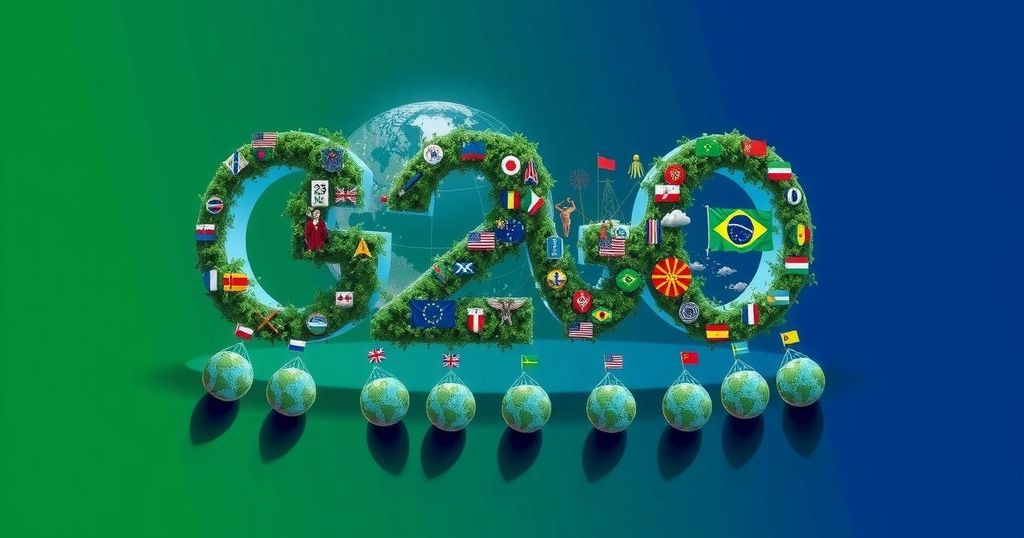G20 Summit Highlights Climate Crisis Amidst Global Tensions Over Finance
The G20 summit in Brazil is focused on addressing the climate crisis alongside UN Cop29 negotiations in Azerbaijan. Leaders are urged to reach an agreement on climate finance, with ambitions to mobilize over $1 trillion for developing nations. The summit’s outcome is crucial for future climate targets as tensions rise over the contributions of emerging economies, especially amidst the potential withdrawal of the United States from climate agreements under the new administration.
The G20 summit in Brazil has placed the climate crisis at the forefront of its agenda, coinciding with the UN Cop29 climate negotiations in Baku, Azerbaijan. Global leaders are collectively striving to resolve the impasse surrounding climate finance, essential for combating global warming. Spanning two days, discussions will encompass various pressing issues, including poverty, hunger, and the reform of global institutions, while noting that G20 nations, which account for a significant portion of global greenhouse gas emissions and economic wealth, hold crucial responsibilities in addressing climate change. The success of the summit hinges on the ability of G20 leaders to align on climate finance, particularly with calls to mobilize over $1 trillion for developing countries to bolster their efforts towards emission reductions. As highlighted by UN Secretary-General Antonio Guterres, the G20 must take the lead in global climate action, given their substantial contributions to emissions and economic power. Tensions arose among nations, particularly regarding the inclusion of wealthier emerging economies in financial commitments, which has complicated discussions on reaching a unified stance. Furthermore, with the anticipated reinstatement of US President-elect Donald Trump, there are concerns that the United States may withdraw from previous climate agreements, hindering collaborative efforts. Notably, Brazil’s upcoming Cop30 climate summit is aiming for the “Mission 1.5” initiative, which focuses on achieving the Paris Agreement’s goal of limiting global warming to 1.5°C. However, achieving this will necessitate significant financial commitments from developed nations, particularly to assist emerging economies in enhancing their climate targets, as these countries emphasize the need for financial accountability from major historical polluters.
The G20 summit convenes the leaders of the world’s largest economies whose decisions profoundly influence global economic and environmental policies. Climate finance is critical to helping developing nations reduce their greenhouse gas emissions and adapt to climate change effects. The failure to meet the financial needs of developing countries could jeopardize international climate targets, especially in light of ongoing negotiations at the UAE-hosted Cop29 and the upcoming Cop30 in Brazil. These discussions involve complicated geopolitical dynamics as wealthier nations consider the role of emerging economies like China in funding climate adaptation and mitigation strategies.
The G20 summit serves as a critical platform for addressing the climate crisis, emphasizing the need for a collaborative approach to climate finance. With the stakes high, countries must navigate their economic responsibilities and contributions to tackle global warming effectively. The outcomes of these discussions could influence future climate agreements and the global response to climate change, especially as preparations for Cop30 unfold. Achieving consensus on equitable financial contributions is essential for fostering trust and cooperation among nations moving forward.
Original Source: www.rfi.fr




Post Comment